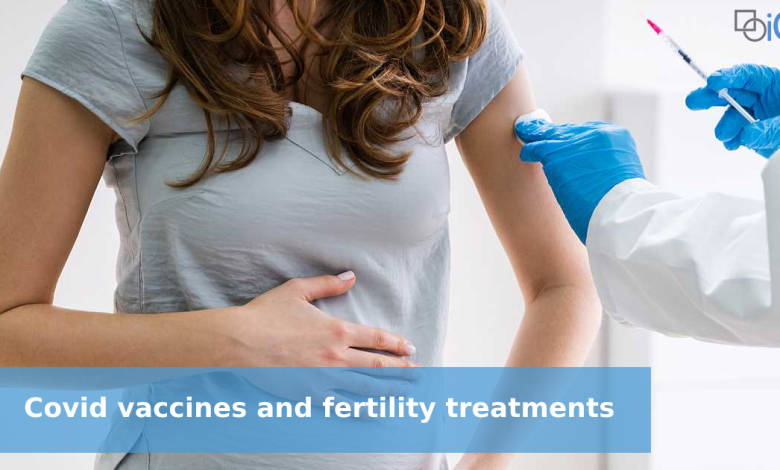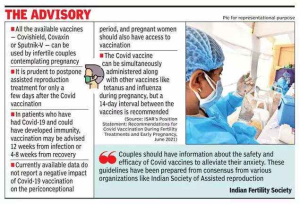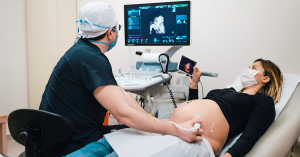Couples Considering IVF Treatment Should Know The Following Before Taking COVID Jabs

In Vitro Fertilization treatments have helped a lot of couples in getting pregnant. IVF has also opened the doors for single women aspiring for motherhood. IVF is making remarkable progress in ART (Assisted Reproductive Technology), and the success rate is improving along with time. However, since the Covid-19 pandemic strike, things are not going well, and extreme precautions are required while undergoing IVF treatment on both ends. But this does not mean that one should not undergo IVF treatment.
Times are tough, but as a normal pregnancy, IVF treatments also must be continued irrespective of the Covid situation. Since the chances of transmitting Covid-19 from mother to child are exceptionally low. With the Covid vaccine rolling out in the country, couples considering IVF treatment are sceptical about getting jabbed. There are many theories that people have created about getting vaccinated before the IVF treatment. Let us see whether the theories you have heard stand correct or not.
What Is The Situation of IVF Treatment After COVID?

The research has shown that fertility in both men and women is declining worldwide due to various lifestyle factors like pollution, lack of nutrition, stress, etc. Some of which are under control, and many are not. The pandemic added stress to our already unhealthy lifestyle, especially to the woes of couples undergoing IVF treatment.
Because of the pandemic, many couples postponed their IVF treatment. Though COVID-19 does not directly affect IVF treatment success rates, people are afraid of transmitting COVID-19 during the process. But this should not stop couples from getting the treatment as most reproductive age patients are generally not in the high-risk group.
For safety purposes, many internationally recommended safety measures have been put into place. For the initial and follow-up consultations, doctors hold Teleconsultations. Most of the blood investigations are done using home visits. The patients are sent to the labs and clinics near their residence for necessary tests, like semen tests and an ultrasound examination.
Every clinic has installed special air cleaning and sanitizing systems in outpatient and inpatient operation theatres and labs. It minimizes the risk of COVID transmission to couples, doctors, staff, embryos, eggs, or sperm.
If we follow all the safety measures, we can say that it is safe to take IVF treatment. By any chance, if you contract Covid-19 during or before the onset of an IVF treatment, then one should not need to postpone the IVF treatment as this is not just physically but also mentally challenging. IVF treatment and its success primarily depend on hormonal changes and age. Hence it is advised to continue your treatment with all necessary Covid-19 precautions.
Things an IVF Couple Should Consider Before Taking COVID Jabs

With the vaccines rolling out, people undergoing IVF treatment or planning to take the treatment are in perplexity about whether to take the vaccine or not. There are a few points one must know about taking covid vaccines:
- Due to the given risks and severity of COVID-19 disease during pregnancy World Health Organization (WHO), the American Society of Reproductive Medicine (ASRM), and the Royal College of Obstetrics and Gynaecology (RCOG), and Indian bodies recommend the vaccination of pregnant women or women attempting pregnancy.
- Studies suggest that the Covid-19 vaccination does not affect your IVF cycle; it is not a live vaccine. According to reports, couples undergoing IVF treatment showed no in-between cycles differences in ovarian stimulation and embryological variables before and after receiving post mRNA SARS-CoV-2 vaccination. It means that it is harmless to move on with your IVF treatment post-vaccination.
- Covid-19 vaccine does not affect patients’ performance on ovarian reserve in the immediate consequent IVF cycle. The vaccine does not impact the patient’s health or the baby’s health.
- You shouldn’t take the vaccine during procedures like egg pick up or embryo transfer, as fever after the vaccine may be confused with fever because of the process.
Conclusion
Studies show that the risk of COVID-19 infection in a pregnant female is the same as that of a non-pregnant female. Besides, the chances that pregnant women can pass COVID infection to their babies are improbable. Coronavirus was not present in amniotic fluid or breast milk in the majority of patients.
Viewing these facts, it is implausible that COVID-19 can affect your pregnancy. About getting vaccines, it is safe for the woman to get jabbed during the IVF process. Just avoid getting the vaccine during procedures like egg pick up or embryo transfer. But one should take precautions and follow covid guidelines for safe and successful delivery. Astha Fertility Center is a well-known IVF centre in Jaipur with the best IVF processes under expert surveillance and follows all the safety measures for safe and healthy delivery. If you are considering getting IVF treatment, Astha Fertility Center is the best option for you.



